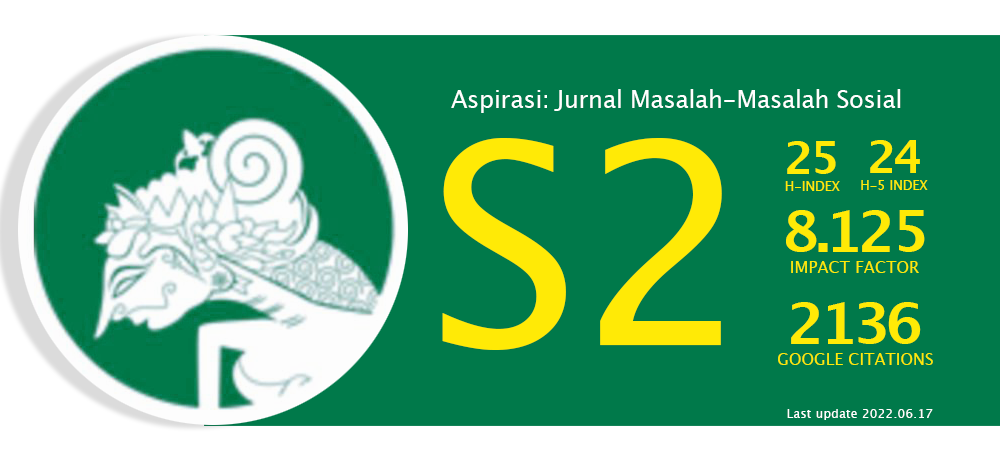Dampak Kebijakan Akreditasi Puskesmas dalam Upaya Peningkatan Kualitas Pelayanan Kesehatan
Abstract
Puskesmas/primary health center (PHC) accreditation policy has a relative
impact on improving health services quality. In addition to management and
organizational improvements, PHC accreditation has negative excesses which can
be seen in the implementation process. Namely, the issue of fulfilling citizens’ basic
rights to health. This study aims to explain some of the negative excesses of PHC
accreditation policy to fulfill health care access. A qualitative analysis of various
interviews in roundtable discussions and secondary data collection on the process
and implementation of accreditation in 12 districts/cities. This study shows that the
PHC accreditation policy that was carried out encouraged a shift in the Government’s
values and norms in providing essential health services, from public goods to private
goods. The management logic that tends to be private-like-oriented places the
community as a consumer rather than as a citizen, not yet maximizing the active role
of the community raises the issue of inequity in the country’s efforts to guarantee the
rights of the community as citizens. The Government places basic health services no
longer fully as public goods, which ensures that every people as a citizen can access
them without exception.
Abstrak
Kebijakan akreditasi puskesmas relatif memiliki pengaruh pada
peningkatan kualitas pelayanan. Selain terdapat perbaikan manajemen dan
organisasi, akreditasi puskesmas memiliki ekses negatif yang terlihat pada proses
implementasinya, terutama dalam permasalahan pemenuhan hak dasar warga
negara atas kesehatan. Studi ini bertujuan menjelaskan bagaimana kebijakan
akreditasi puskesmas menimbulkan ekses negatif dalam pemenuhan akses
pelayanan kesehatan. Penelitian ini menggunakan pendekatan kualitatif. Data
primer diperoleh melalui wawancara mendalam diskusi meja bundar dan data sekunder dari pengalaman pelaksanaan akreditasi puskesmas di 12 kabupaten/
kota. Studi ini menemukan bahwa kebijakan akreditasi puskesmas yang dilakukan
mendorong pergeseran nilai dan norma pemerintah dalam menyelenggarakan
pelayanan kesehatan dasar, yaitu perubahan dari barang publik menjadi
barang privat. Logika pengelolaan yang lebih cenderung private-like-oriented,
menempatkan masyarakat sebagai konsumen dibanding sebagai warga negara,
belum maksimalnya peran aktif masyarakat memunculkan isu kesenjangan dalam
upaya negara menjamin hak masyarakat sebagai warga negara. Pemerintah
menempatkan pelayanan kesehatan dasar tidak lagi sepenuhnya sebagai barang
publik yang menjamin setiap masyarakat sebagai warga negara mampu mengakses
tanpa terkecuali.
Keywords
Full Text:
PDFReferences
Adam, E. S., Suparwati, A., & Arso, S. P. (2017). Analisis kesiapan implementasi badan layanan umum daerah puskesmas Kota Semarang (Studi kasus pada Puskesmas Ngesrep dan Bandarharjo). Jurnal Kesehatan Masyarakat, 5(1), 59–67.
Al Tehewy, M., Salem, B., Habil, I., & El Okda, S. (2009). Evaluation of accreditation program in non-governmental organizations’ health units in Egypt: Short-term Outcomes. International Journal for Quality in Health Care, 21(3), 183–189. https://doi.org/10.1093/intqhc/mzp014
Alhassan, R. K., Nketiah-Amponsah, E., Ayanore, M. A., Afaya, A., Salia, S. M., Milipaak, J., Ansah, E. K., & Owusu-Agyei, S. (2019). Impact of a bottom-up community engagement intervention on maternal and child health services utilization in Ghana: A cluster randomised trial. BMC Public Health, 19(1), 791. https://doi.org/10.1186/s12889-019-7180-8
Andhika, L. R. (2017). Meta-Theory: Kebijakan barang publik untuk kesejahteraan Rakyat. Jurnal Ekonomi & Kebijakan Publik, 8(1), 41–55. https://doi.org/10.22212/jekp.v8i1.697
Andres, E. B., Song, W., Song, W., & Johnston, J. M. (2019). Can hospital accreditation enhance patient experience? Longitudinal evidence from a Hong Kong hospital patient experience survey. BMC Health Services Research, 19(1), 623. https://doi.org/10.1186/s12913-019-4452-z
Araujo, C. A. S., Siqueira, M. M., & Malik, A. M. (2020). Hospital accreditation impact on healthcare quality dimensions: A systematic review. International Journal for Quality in Health Care, 32(8), 531–544. https://doi.org/10.1093/intqhc/mzaa090
Badan Perencanaan Pembangunan Nasional. (2018). Penguatan pelayanan kesehatan dasar di Puskesmas. Direktorat Kesehatan dan Gizi Masyarakat.
Baharuddin, N. H., Lazuardi, L., & Handono, D. (2016). Kesenjangan distribusi tenaga kesehatan di puskesmas wilayah Indonesia timur (Analisis data IFLS East 2012). Jurnal Manajemen Pelayanan Kesehatan, 19(3), 01–06.
Buana, H. C. (2022). Refocusing dana alokasi khusus (Dak) dalam Pengelolaan Anggaran Daerah. Jurnal Ilmu Sosial Dan Pendidikan, 6(6), 2212–2219. http://dx.doi.org/10.58258/jisip.v6i4.3620
Campos, P. A., & Reich, M. R. (2019). Political analysis for health policy implementation. Health Systems & Reform, 5(3), 224–235. https://doi.org/10.1080/23288604.2019.1625251
Choe, H., & Yun, S. J. (2017). Revisiting the concept of common pool resources: Beyond Ostrom. Development and Society, 46(1), 113–129. https://doi.org/10.21588/dns/2017.46.1.005
Choi, J.-W. (2016). New public management or mismanagement? The case of public service agency of Indonesia. Journal of Government and Politics, 7(1), 104. https://doi.org/10.18196/jgp.2016.0024
Creswell, J. W. (2004). Designing a mixed methods study in primary care. The Annals of Family Medicine, 2(1), 7–12. https://doi.org/10.1370/afm.104
Denhardt, J. V., & Denhardt, R. B. (2015). The new public service revisited. Public Administration Review, 75(5), 664–672. https://doi.org/10.1111/puar.12347
Diab, S. M. (2015). The effect of primary health accreditation standards on the primary health care quality and employees satisfaction in the Jordanian Health Care Centers. International Journal of Academic Research in Business and Social Sciences, 5(4), 204–220. https://doi.org/10.6007/ijarbss/v5-i4/1568
Direktorat Mutu dan Akreditasi Pelayanan Kesehatan. (2020, January). Laporan akuntabilitas kinerja direktorat mutu dan akreditasi pelayanan kesehatan: Tahun Anggaran 2020. Https://Yankes.Kemkes.Go.Id/Lakip_files/Direktorat_mutu_akreditasi_pelayanan_kesehatan_lakip_2020.Pdf.
Ekowati, D., Hofstee, C., Praputra, A. V., & Sheil, D. (2016). Motivation matters: Lessons for REDD+ participatory measurement, reporting and verification from three decades of child health participatory monitoring in Indonesia. PLoS ONE, 11(11), 1–20. https://doi.org/10.1371/journal.pone.0159480
El-Jardali, F., Hemadeh, R., Jaafar, M., Sagherian, L., El-Skaff, R., Mdeihly, R., Jamal, D., & Ataya, N. (2014). The impact of accreditation of primary healthcare centers: Successes, challenges and policy implications as perceived by healthcare providers and directors in Lebanon. BMC Health Services Research, 14(86), 1–10.
Farzana, N., Suparwati, A., & Arso, S. P. (2016). Analisis kesiapan akreditasi dasar Puskesmas Mangkang di Kota Semarang.Jurnal Kesehatan Masyarakat (e-Journal), 4(4), 94–103.
Harjula, M. (2016). Health citizenship and access to health services: Finland 1900 – 2000. Social History of Medicine, 29(3), 573–589. https://doi.org/10.1093/shm/hkv144
Hasjimzum, Y. (2014). Model demokrasi dalam peningkatan kualitas pelayanan publik (Studi otonomi daerah dalam peningkatan kesejahteraan masyarakat pasca reformasi). Jurnal Dinamika Hukum, 14(3). https://doi.org/10.20884/1.jdh.2014.14.3.310
Heim, C. E. (2015). Introduction: Public and private provision of urban public goods. Social Science History, 39(3), 361–369. https://doi.org/10.1017/ssh.2015.60
Horne, L. C. (2019). Public health, public goods, and market failure. Public Health Ethics, 12(3), 287–292. https://doi.org/10.1093/phe/phz004
Kronstadt, J., Meit, M., Siegfried, A., Nicolaus, T., Bender, K., & Corso, L. (2016). Evaluating the Impact of National Public Health Department Accreditation ― United States, 2016. MMWR. Morbidity and Mortality Weekly Report, 65(31), 803–806. https://doi.org/10.15585/mmwr.mm6531a3
Maharani, A., & Tampubolon, G. (2017). The double-edged sword of corporatisation in the hospital sector: Evidence from Indonesia. Health Economics, Policy and Law, 12(1), 61–80. https://doi.org/10.1017/S174413311600027X
Maharani, A., & Tampubolon, G. (2018). Does corporatisation improve organisational commitment? Evidence from public hospitals in Indonesia. International Journal of Human Resource Management, 29(13), 1–28. https://doi.org/10.1080/09585192.2016.1239121
Mariana, D. (2017). Partisipasi masyarakat dalam proses kebijakan. CosmoGov, 1(2), 216. https://doi.org/10.24198/cosmogov.v1i2.11834
Mawarni, E. A., & Wuryani, E. (2020). Analisis kinerja puskesmas yang menerapkan pola pengelolaan keuangan badan layanan umum daerah (PPK-BLUD) (Studi pada Puskesmas Krian Kabupaten Sidoarjo). Jurnal Akuntansi AKUNESA, 9(1). https://doi.org/10.26740/akunesa.v9n1.p%p
Misnaniarti, M., & Destari, P. K. (2018). Aspek penting akreditasi puskesmas dalam mendukung implementasi jaminan kesehatan nasional. Jurnal Penelitian dan Pengembangan Pelayanan Kesehatan, 2(1), 10–16. https://doi.org/10.22435/jpppk.v2i1.35
Mokobimbing, V. M., Mandagi, C. K. F., & Korompis, G. E. C. (2019). Analisis tingkat kepuasan pasien ditinjau dari perbedaan status akreditasi pelayanan kesehatan Puskesmas Sario dan Puskesmas Ranotana Weru Kota Manado. Jurnal Kesehatan Masyarakat, 8(5), 11–25.
Molyadi, M., & Trisnantoro, L. (2018). Pelaksanaan kebijakan akreditasi puskesmas di Kabupaten Kubu Raya. Jurnal Kebijakan Kesehatan Indonesia : JKKI, 7(1), 18–23. https://doi.org/10.22146/JKKI.25486
Nasikun. (2003). Privatisasi sistem pelayanan kesehatan dan implikasinya bagi perumusan agenda penelitian dan kebijakan publik. Jurnal Populasi, 14(2), 45–62.
Nazri, C., Yamazaki, C., Kameo, S., Herawati, D. M. D., Sekarwana, N., Raksanagara, A., & Koyama, H. (2016). Factors influencing mother’s participation in Posyandu for improving nutritional status of children under-five in Aceh Utara district, Aceh province, Indonesia. BMC Public Health, 16(1), 1–10. https://doi.org/10.1186/s12889-016-2732-7
Nichols, L. M., & Taylor, L. A. (2018). Social determinants as public goods: A new approach to financing key investments in healthy communities. Health Affairs, 37(8), 1223–1230. https://doi.org/10.1377/hlthaff.2018.0039
Palumbo, R. (2017). Toward a new conceptualization of health care services to inspire public health. Public national health service as a “common pool of resources.” International Review on Public and Nonprofit Marketing, 14(3), 271–287. https://doi.org/10.1007/s12208-017-0175-1
Pardosi, J. F., Parr, N., & Muhidin, S. (2014). Inequity issues and mothers’ pregnancy, delivery and early-age survival experiences in Ende District, Indonesia. Journal of Biosocial Science, 47(06), 780–802. https://doi.org/10.1017/S0021932014000522
Pribadi, U. (2013). Organizational structure and public service satisfaction in Yogyakarta City. Jurnal Studi Pemerintahan, 4(2), 374–389. http://dx.doi.org/10.18196/jgp.2013.0026
Sieveking, A. (2019). Food policy councils as loci for practising food democracy? Insights from the case of Oldenburg, Germany. Politics and Governance, 7(4), 48–58. https://doi.org/10.17645/pag.v7i4.2081
Singto, C., Fleskens, L., & Vos, J. (2018). Institutionalizing participation in water resource development: Bottom-up and top-down practices in Southern Thailand. Water (Switzerland), 10(6), 781–798. https://doi.org/10.3390/w10060781
Sulistinah, A., Witcahyo, E., & Sandra, C. (2017). Kajian kesiapan dokumen Akreditasi Kelompok Kerja Administrasi Manajemen di UPT Puskesmas Jelbuk Dinas Kesehatan Kabupaten Jember. E-Journal Pustaka Kesehatan, 5(3), 580–587.
Suryanto, Plummer, V., & Boyle, M. (2017). Healthcare system in Indonesia. Hospital Topics, 95(4), 82–89. https://doi.org/10.1080/00185868.2017.1333806
Susilawati. (2017). Gambaran implementasi akreditasi puskesmas di Kabupaten/Kota Provinsi Sumatra Utara Tahun 2016. JUMANTIK, 2(2), 89–99.
Tabrizi, J. S., & Gharibi, F. (2019). Primary healthcare accreditation standards: A systematic review. International Journal of Health Care Quality Assurance, 32(2), 310–320. https://doi.org/10.1108/IJHCQA-02-2018-0052
Tawalujan, T. W., Korompis, G. E. C., & Maramis, F. R. R. (2018). Hubungan antara status akreditasi puskesmas dengan tingkat kepuasan pasien di Kota Manado. Kesmas, 7(5), 1–11.
Triprasetya, A. S., Trisnantoro, L., & Eka, N. L. P. (2014). Analisis Kesiapan Penerapan Kebijakan Badan Layanan Umum Daerah (BLUD ) Puskesmas di Kabupaten Kulon Progo ( Studi Kasus di Puskesmas Wates dan Puskesmas Girimulyo II Kabupaten Kulon Progo ) An Analysis on the Readiness to Apply Local Public Service Agen. Jurnal Kebijakan Kesehatan Indonesia, 03(03), 124–137.
Waluyo, I. (2011). Badan layanan umum sebuah pola baru dalam pengelolaan keuangan di satuan kerja pemerintah. Jurnal Pendidikan Akuntansi Indonesia, 9(2), 1–15. https://doi.org/10.21831/jpai.v9i2.962
Widaningtyas, E. (2018). Kesiapan tata kelola puskesmas menjadi badan layanan umum daerah (BLUD). Jurnal Manajemen Informasi Kesehatan Indonesia, 6(1), 20–26. https://doi.org/10.33560/.v6i1.180
Widiastuti, I., Jati, S. P., & Purnaweni, H. (2019). Factors affecting team effectivness in Semarang Community Health Center Working Group after accreditation. Visikes: Jurnal Kesehatan Masyarakat, 18(2), 67–78.
Wulandari, R. D., Ridho, I. A., Supriyanto, S., Qomarrudin, M. B., Damayanti, N. A., Laksono, A. D., & Rassa, A. N. F. (2019). Pengaruh pelaksanaan akreditasi puskesmas terhadap kepuasan pasien. Jurnal Media Kesehatan Masyarakat Indonesia, 15(6), 228–236. http://dx.doi.org/10.30597/mkmi.v15i3.6195 228
Zega, I., Richadi, R. K., Tarigan, F. L., Nababan, D., Sitorus, M. E. J., & Warouw, S. P. (2022). Analisis kesiapan UPT Puskesmas Lotu menghadapi akreditasi puskesmas. PREPOTIF : Jurnal Kesehatan Masyarakat, 6(1), 98–112. https://doi.org/10.31004/prepotif.v6i1.2738
DOI: https://doi.org/10.46807/aspirasi.v14i1.3039
Refbacks
- There are currently no refbacks.








